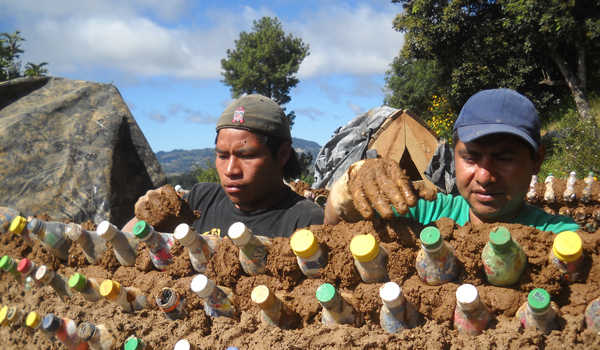Long Way Home: Promoting Sustainability in Rural Guatemala

San Juan Comalapa is a municipality in the indigenous west-central highlands of Guatemala. Comalapa exists in a state of relative poverty, with no formal recycling or waste-management system.
Refuse material is often dumped in lakes or ravines – contaminating the water supply – or used to fuel stoves for cooking – contributing to the respiratory problems suffered by many locals. Long Way Home is working hard to educate the local people about these environmental issues and encourage them to become involved in a democratic process of sustainable development in their community.
Director of Long Way Home, Matt Paneitz, founded the organisation in 2004. The first major project undertaken by the fledgling organisation was the construction of a community park - Parque Chimiyá during which the team lived on-site. Working so closely with the local community on this project, Matt quickly identified the relationship between the local environmental issues and the difficulties faced by the community day-to-day. Recreational facilities were not the priority, and so Long Way Home adapted its strategy.
"While the main crew was living at the park, and living with the people, we experienced some of the same pain that they (the community) did. That there's no water, that there's no firewood, that there are no jobs. That the (refuse) contamination is just everywhere. So, the vocational school came because we wanted to expand our impact".
Matt Paneitz │Executive Director, Long Way Home
In January 2009, Long Way Home broke ground on the Centro Educativo Técnico Chixot (CETC) campus. CETC was constructed using a variety of sustainable, eco-friendly methods to address the environmental issues in Comalapa directly. Supporting walls were built using earth-packed tyres, and plastic bottles stuffed with rubbish and then finished using cob – an eco-friendly alternative to cement consisting of dirt, manure and hay. Two rainwater cisterns provide the school's water while solar panels supplement electricity requirements, the aim being eventually to become completely energy self-sufficient.
The construction of CETC has had an enormous impact on the local environmental issues with over 16,000 reclaimed tyres, over 9,000 glass bottles, and over 24,000 rubbish bottles used to date. However, education is recognised to be the key to truly sustainable long-term change. The Long Way Home team set about investigating the most significant issues facing the local community, and how best to educate young people to overcome these issues.
"What we found through our investigation of what the problems are is that the number one reason that people go to the health centre are respiratory issues. They have open flames indoors, and they burn Styrofoam cups to heat their tortillas. That's a huge problem!"
Matt Paneitz │Executive Director, Long Way Home
Each grade of post-primary education (7th – 12th grade) at CETC focuses on addressing a unique issue in the community as identified by Long Way Home's investigation. In 7th grade, the focus is on respiratory problems. The curriculum in this year culminates in students building a smoke-effective stove for a rural family. In 8th grade, students develop a water storage "tinaco". In 9th grade, they create a dry composting latrine. In 10th grade, a tyre retaining wall, and in 11th grade, a cistern. In 12th grade, students combine everything they have learned in the previous five years to build a tyre house for a family in need.
"There are escalating levels of complexity that require some knowledge of what you did in the previous grade to elevate to the next grade….The students love that!"
Matt Paneitz │Executive Director, Long Way Home
The traditional curriculum is soon to be further augmented with the upcoming introduction of the Hero School Model of democratic education. So, what effect has CETC had upon its students so far?
"Well, quite a few are builders that are building with us! They have been hired to do jobs that are pretty well paying. Also, our first students have just graduated from high-school, and ten of the twelve (graduates) are going to college".
Matt Paneitz │Executive Director, Long Way Home

When asked to name one skill or resource, he hopes young people who attend CETC would graduate with; Matt wasted no time in providing his answer: "The ability to participate in the democratic process fully!"
To find out more about Long Way Home and Centro Educativo Técnico Chixot, click here!
To find out how you can participate in Long Way Home's Green Building Academy, click here!
To read the full article, click here!
